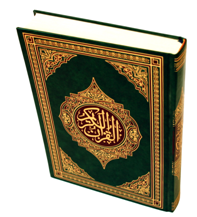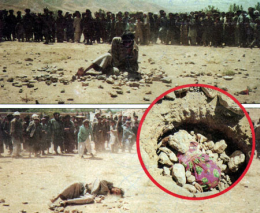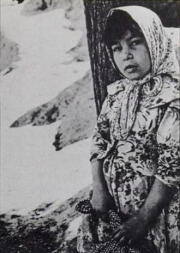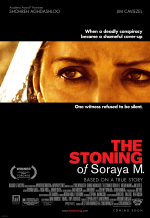


Stoning to Death: A Violation of the Qur'an
 The true believing men and women are united by their strong faith in Allah and behave in the
best manner possible. The Qur'an governs their behaviour. In a community
of true believers, if lewd behaviour is proven between two people, they
should be appropriately punished. However, instead of following the Qur'an, so-called
Muslims have introduced a different punishment.
The true believing men and women are united by their strong faith in Allah and behave in the
best manner possible. The Qur'an governs their behaviour. In a community
of true believers, if lewd behaviour is proven between two people, they
should be appropriately punished. However, instead of following the Qur'an, so-called
Muslims have introduced a different punishment.
The Qur'an has paved the way for those who love Allah and desire the eternal Paradise of Allah. One aspect which the Qur'an addresses for believers is their conduct among themselves. Allah sets high moral standards for male and female believers in their interaction with one another.
In the Qur'an, an official marriage is the only way a man and woman can begin a sexual relationship. Marriages are based on a firm covenant between Allah and the couple. It provides the best foundation for a happy relationship as it is based on devotion to Allah. It therefore, provides the most stable platform for children to be raised in. Among disbelievers, one can observe a depressing scene such as pregnant women being abandoned by their 'boyfriends', young girls getting pregnant and seeking abortions, 'illegitimate' children with unknown fathers, and even mothers abandoning unwanted newborn babies.
Allah strongly prohibits sex outside of marriage. Allah states that believers must not come near adultery or fornication (17:32) and they must also not allow it to breed in a society of believers. It is for these reasons, Allah states the following:
"This is a chapter We have sent down and made obligatory. We have sent down clear revelations in it so that you may take heed: flog the male and the female adulterers and fornicators (الزانية والزاني) one hundred times. Do not let compassion for them keep you from carrying out Allah's law if you believe in Allah and the Last Day - and ensure a group of believers witnesses the punishment." (Qur'an 24:2)
In this verse, Allah clearly defines an earthly punishment for the above sinners - one hundred lashes. The believers listen to Allah and obey Him. However, so-called followers of the Qur'an, disguised believers, have come up with a teaching violating the Qur'an. The above verse defines the punishment for both adulterers and fornicators, the Arabic words used الزانية والزاني covers both adulterers and fornicators - it refers to all types of extramarital sex. The punishment they propose is one hundred lashes for the fornicator, but killing the adulterer by stoning him or her to death. This punishment has not been prescribed anywhere in the Qur'an. However, it is a punishment described in the Bible and appears in the books of hadith, despite being contradictory to Quranic teachings.

Under the so-called Islamic law of Iran, adultery is punishable by stoning to death and men and women have been sentenced to this barbaric punishment.
"We assigned to every prophet an enemy, Satan human and jinn to inspire fancy words to one another in order to deceive - Had your Lord willed so, they would not have done it, so leave them and their fabrications". (Qur'an 6:112)
Although these propagators could not change the physical words of the Qur'an, they try their best to prove to their followers that their interpolations based on invented hearsay are true. One wonders, why do they continue to do such a thing to this day if they are believers and are reading the Qur'an to follow it? The answer is their actual lack of faith. This group of people do not carry the intention to submit to Allah when reading the Qur'an, but to use the Qur'an to help mould a preconceived religion based on pre-acceptance of that hearsay. Today, such outright violations are iced over in front of people with sugary words such as how glorious and of a high status the Qur'an is, when truly in their hearts, they do not comprehend the verses.
A true believer is aware of such people. These people show themselves to be devout Muslims yet, they twist Allah's Book and interpolate from hearsay without hesitancy. One can never be a true believer, if he is a distorter of Allah's Book. A person is also not a true believer if he or she is not troubled when hearing or reading claims that are against the Qur'an, and who pretends not to see contradictory claims made against the Qur'an. This is because, when one is a real believer, he or she truly loves and obeys Allah. This is reflected in their desire to follow the words of Allah as has been revealed to be followed and they acknowledge when they see twisted claims contrary to Quranic teachings. Only a lack of faith, love and fear of Allah, can lead people to uphold teachings which are outright against the Quranic teachings, as is being done in this case, and many others. Allah is fully aware of all fabricators and interpolators, no matter much how much they deceive the majority:
"Among them is a group who distort the Book with their tongues so that you think it is from the Book when it is not from the Book. They say, 'it is from Allah', but it is not from Allah. They tell a lie against Allah and they know it." (Qur'an 3:78)
Initially, they deceive their followers that the Qur'an is 'incomplete' and other books are needed. Once they have gained the license to add to the guidance of the Qur'an, they interpolate using their mouths and their own books of hearsay. Allah reprehends them and their blind followers in the following verse:
"What is wrong with you? How do you make your judgments? Do you have another Book which you study? In which you find whatever you wish to find? Have you taken a pledge from Us up until the Day of Judgment that you will get your way in the judgments you make?" - (Qur'an 68:35-39)
The Stoning to Death of Aisha Ibrahim, Sudan
Aisha Ibrahim Duhulow (age 13) was killed on Monday, 27 October 2008, by a group of 50 men who stoned her to death in a stadium in the southern port of Kismayu, in front of around 1,000 spectators.
Some of the Somali journalists who had reported she was 23 have told Amnesty International that this age was based upon a judgement of her age from her physical appearance.
She was accused of adultery in breach of Islamic law but, her father and other sources told Amnesty International that she had in fact been raped by three men, and had attempted to report this rape to the al-Shabab militia who control Kismayo, and it was this act that resulted in her being accused of adultery and detained. None of the men she accused of rape were arrested.
“This was not justice, nor was it an execution. This child suffered a horrendous death at the behest of the armed opposition groups who currently control Kismayo,” said David Copeman, Amnesty International's Somalia Campaigner.
Amnesty International has learnt that:
● She was detained by militia of the Kismayo authorities, a coalition of Al-shabab and clan militias. During this time, she was reportedly extremely distressed, with some individuals stating she had become mentally unstable.
● A truckload of stones was brought into the stadium to be used in the stoning.
● At one point during the stoning, Amnesty International has been told by numerous eyewitnesses that nurses were instructed to check whether Aisha Ibrahim Duhulow was still alive when buried in the ground. They removed her from the ground, declared that she was, and she was replaced in the hole where she had been buried for the stoning to continue.
● An individual calling himself Sheik Hayakalah, was quoted on Radio Shabelle saying: "The evidence came from her side and she officially confirmed her guilt, while she told us that she is happy with the punishment under Islamic law.'' In contradiction to this claim, a number of eye witnesses have told Amnesty International she struggled with her captors and had to be forcibly carried into the stadium.
● Inside the stadium, militia members opened fire when some of the witnesses to the killing attempted to save her life, and shot dead a boy who was a bystander. An al-Shabab spokeperson was later reported to have apologized for the death of the child, and said the milita member would be punished.(1)
The Stoning to Death of Soraya Manutchehri - Kupayeh, Iran
The victim was Soraya Manutchehri, a 35-year-old mother of seven who, in her own prophetic words, had become "an inconvenient wife." Bartered away in an arranged marriage at 13 to a petty criminal named Ghorban-Ali, who was 20 years old at the time, Soraya bore nine children over the next two decades, enduring two stillborn births and regular beatings from her husband, along with his insults, his consorting with prostitutes, and his campaign to turn her two oldest sons against her.
 In the anarchic days of the Iranian Revolution, Ghorban-Ali had
found work as a prison guard in a neighbouring town.
There, he met a 14-year-old girl whom he wanted to
marry. Polygamy was encouraged in Ayatollah Khomeini's
Iran, but Ghorban-Ali didn't want to support two
families, and did not desire to return his wife's dowry.
How to rid himself of his "old" wife? That was the easy
part. Accuse her of infidelity. No matter that her
husband had not actually seen anything untoward, or that
Soraya was completely innocent, or that her husband's
cynical accusations were only backed up by his cousin,
who as it turned out had been coerced into concurring
with the vaguest of accusations: a smile here, a brushed
hand there.
In the anarchic days of the Iranian Revolution, Ghorban-Ali had
found work as a prison guard in a neighbouring town.
There, he met a 14-year-old girl whom he wanted to
marry. Polygamy was encouraged in Ayatollah Khomeini's
Iran, but Ghorban-Ali didn't want to support two
families, and did not desire to return his wife's dowry.
How to rid himself of his "old" wife? That was the easy
part. Accuse her of infidelity. No matter that her
husband had not actually seen anything untoward, or that
Soraya was completely innocent, or that her husband's
cynical accusations were only backed up by his cousin,
who as it turned out had been coerced into concurring
with the vaguest of accusations: a smile here, a brushed
hand there.
Above-right: The only photograph of Soraya ever taken. When she was 9 years old, an itinerant photographer passed through her village and left this portrait.(3)
What court of law would find someone guilty on such flimsy evidence? A "sharia" court is the answer. And so Soraya was convicted. The sentence was death-death by stoning.(2)
On August
15, 1986, Soraya Manutchehri (at the age of 35) was buried in a hole up to her
shoulders and stoned to death. Her father, sons, and
husband were the first to cast stones at her head. The man
with whom she was alleged to have illicit sex was not
punished, but he was given the honour of being the first to
throw a stone after the male
members of her family.
Then all the male members of the village were given an opportunity to
defend the honour of the village by casting stones at Soraya
to kill her.
 She maintained her innocence. After Soraya's
death, her body was left out in the fields for the animals
to ravage.(4)
She maintained her innocence. After Soraya's
death, her body was left out in the fields for the animals
to ravage.(4)
Reporter Freidoune Sahebjam published a book on Soraya Manutchehri in 1994 called "The Stoning of Soraya M.". Inadvertently, his car broke down in the remote village soon after Soraya's stoning to death which provided the opportunity for her case to come to light, also reaffirming the possibility of other cases which are never reported. In 2008, his book has been adapted to a movie by the name of the book. Right: Poster of the movie "Stoning of Soraya M.". Book sample here - Movie trailer here
Stoning to death of adulterers is a punishment found in the Bible, as well as 'hadiths' attributed to the prophet. During the era of hadith development, that is, 200 to 600 years after hijra, one of the prevalent sources of the era's rampant hadith fabrications were what are known as Isaraliyat fabrications. These originate from Jews and Christians who wished to insert their teachings into Islam. Muhammad Hashim Kamali writes in his "The Textbook of Hadith Studies"
"Qur'an commentaries (tafsir) in both the tafsir bil-mathur (commentary based on precedent) and tafsir bil-ray varieties have not escaped forgeries especially in regard to what is known as Jewish anecdotes (Israliyat). It is noted in this connection that prior to Islam when the Bedouin and illiterate strata of the Arabian people wanted to learn more about certain subjects such as the origins of creation and its mysteries, turmoil and fitna, and so forth they asked the Jews and Christians who has known of such subjects from the Torah and the Bible. Later when these people converted to Islam they conveyed the information they had in their commentaries and elaborations on the Qur'anic passages, especially on subjects outside the area of the ahkam. Some of the recognised names among the ahl al-kitab such as Abd Allah b. Sallam, Kab al-Ahbar, and Wahb b. Munabbih were famed for their anecdotes and stories some of which then found their way into the context of the Qur'anic commentaries. Since these were stories and anecdotes outside of the ahkam, their veracity was often overlooked. "The Qur'an commentaries treated these relatively lightly and filled their tafsir works with such anecdotes ... " that were of questionable origin and content." (Chapter 7: Hadith Forgery, Paragraph 19)
In conclusion, stoning to death does not have any basis in the true religion of Allah. It does not have any origin in the Qur'an, the only infallible guide and contradicts outright the Quranic punishment provided. True believers who are on the guided path of Allah, do not uphold this outright violation of the Qur'an.
“Shall I then seek a Judge other than Allah? When it is He Who has revealed to you the Book fully detailed?” (Qur'an 6:114)
“Have you considered those who were asked to accept judgement from Allah’s Book? When they are asked to accept judgement from Allah’s Book, some of them turn their backs and walk away” (Qur’an 3:23)
See also: Less Known Aspect of Hadith: Hadith Forgery
Circumcision - Does the Qur'an Approve it?
Qur'an: Complete & Fully Detailed

Copyright © , QuranicPath. All Rights Reserved.

